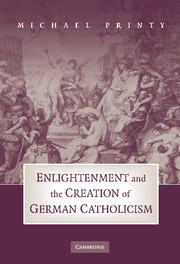Book contents
- Frontmatter
- Contents
- Acknowledgments
- 1 Introduction
- Part One PERFECT SOCIETIES: RETHINKING THE CHURCH AND THE STATE
- 2 The Liberty of the German Church: Febronianism and the German Gallicans
- 3 The German Church and the Absolute State
- 4 Church and Empire in the Eighteenth Century
- 5 Collegialism: The Rise of the State and the Redefinition of the Church
- Part Two THE UNIVERSAL CHURCH AND THE UNIVERSAL CLASS
- Bibliography
- Index
5 - Collegialism: The Rise of the State and the Redefinition of the Church
Published online by Cambridge University Press: 02 July 2009
- Frontmatter
- Contents
- Acknowledgments
- 1 Introduction
- Part One PERFECT SOCIETIES: RETHINKING THE CHURCH AND THE STATE
- 2 The Liberty of the German Church: Febronianism and the German Gallicans
- 3 The German Church and the Absolute State
- 4 Church and Empire in the Eighteenth Century
- 5 Collegialism: The Rise of the State and the Redefinition of the Church
- Part Two THE UNIVERSAL CHURCH AND THE UNIVERSAL CLASS
- Bibliography
- Index
Summary
PUBLIC LAW AND THE CHURCH
As Hobbes realized, rethinking the state required rethinking the church. The elaboration of a sphere of secular power in opposition to the church was an act of mutual redefinition. The rise of the state was as much an intellectual phenomenon as it was an institutional one. Earlier, we have seen how Catholic princes and their supporters altered ideas about the common good. Given the tradition of Catholic political thought, with its strong commitment to the alliance of church and state, how did absolutist princes legitimate their exertions of financial and legal pressure on the church? One of the ways in which they did this was by subsuming parts of church law under the category of public law (öffentliches Recht, ius publicum). Because of the prominence of public law literature in early modern Germany, conceptualizations of the church were shaped by legal discourse.
The discussion and teaching of public law affected the church's law in two ways. First, the legal reasoning employed in distinguishing public from private law migrated into canon-law literature. Initially, the application of new terms like “public church law” was a neutral development and reflected more a shift of language than any radical new theory of the church. In other words, scholars of church law could organize their subject into private and public church laws without necessarily favoring curialist, conciliar, or Erastian positions. The expression ius publicum ecclesiasticum could be employed to refer to concordat law or particular state–church law.
- Type
- Chapter
- Information
- Enlightenment and the Creation of German Catholicism , pp. 101 - 122Publisher: Cambridge University PressPrint publication year: 2009



